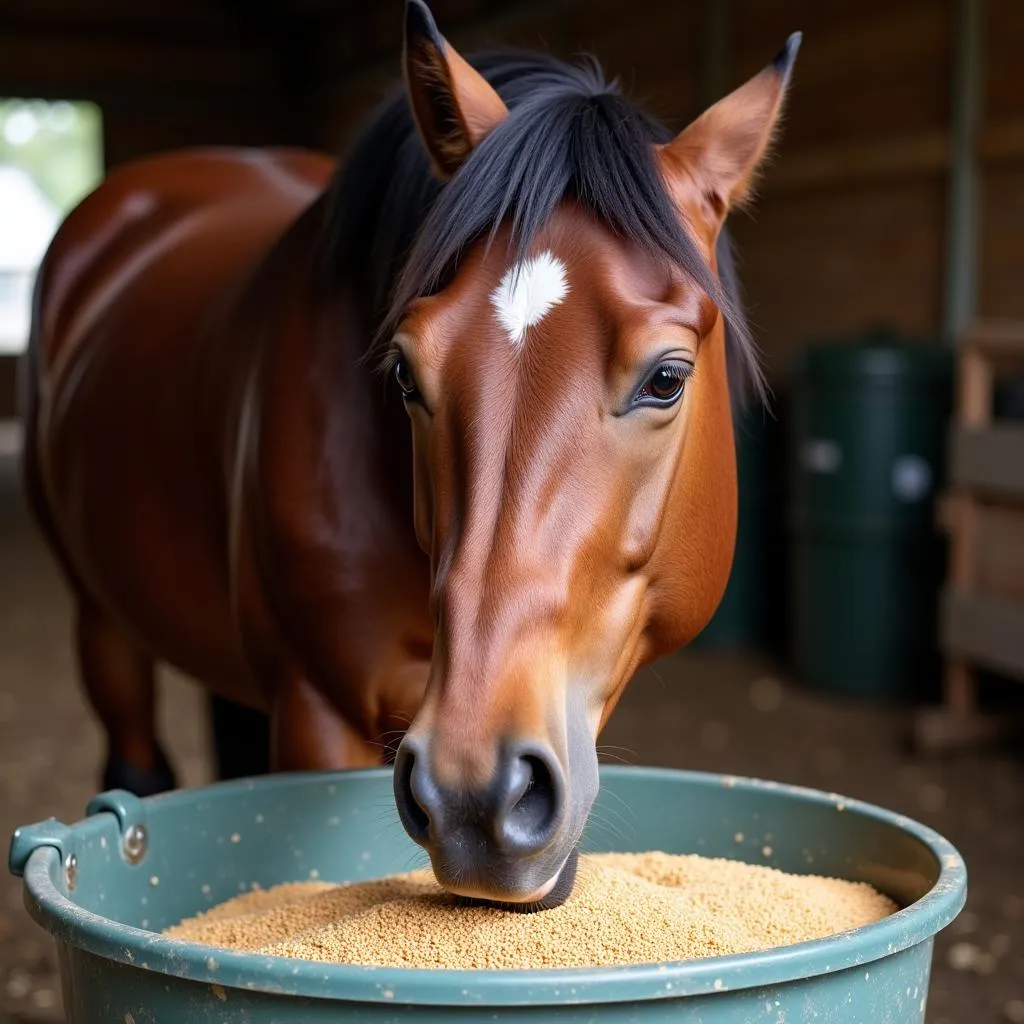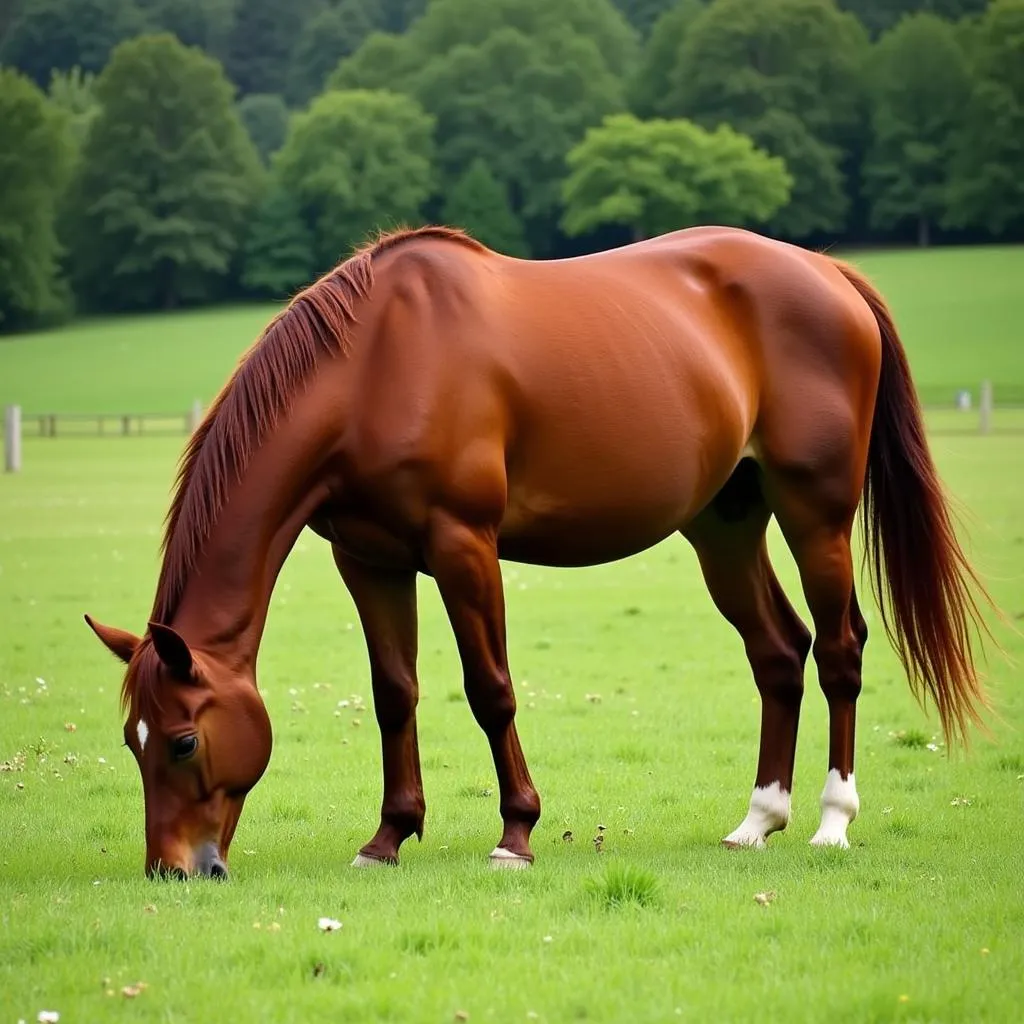Linseed, also known as flaxseed, is a nutritional powerhouse that offers numerous benefits for horses. From improving coat condition to supporting joint health, incorporating linseed into your horse’s diet can significantly impact their overall well-being.
Understanding the Nutritional Value of Linseed for Horses
Linseed is a rich source of essential nutrients, making it a valuable addition to any equine diet. It is particularly notable for its high content of:
- Omega-3 Fatty Acids: Linseed is one of the richest plant-based sources of alpha-linolenic acid (ALA), an omega-3 fatty acid crucial for maintaining healthy skin, a shiny coat, and reducing inflammation.
- Fiber: Both soluble and insoluble fiber are abundant in linseed, promoting healthy digestion and regular bowel movements. This is especially beneficial for horses prone to digestive issues.
- Protein: Linseed provides a good amount of protein, which is essential for muscle development, tissue repair, and overall growth.
- Vitamins and Minerals: Linseed contains various vitamins and minerals, including vitamin E, copper, zinc, and selenium, which contribute to immune function, antioxidant protection, and overall health.
 Horse Eating Linseed from Bucket
Horse Eating Linseed from Bucket
Key Benefits of Linseed for Horses
The unique nutritional profile of linseed translates into a range of health benefits for horses:
1. Enhanced Coat Condition
One of the most noticeable benefits of adding linseed to a horse’s diet is its positive impact on coat health. The omega-3 fatty acids, particularly ALA, help nourish the skin and hair follicles, resulting in a shinier, healthier-looking coat. This is especially beneficial for horses with dull or dry coats, those prone to skin allergies, or during seasonal changes when shedding is more intense.
2. Reduced Inflammation
Omega-3 fatty acids are renowned for their anti-inflammatory properties. Supplementing with linseed can help reduce inflammation throughout the body, benefiting horses suffering from conditions like arthritis, laminitis, or allergies. By managing inflammation, linseed can contribute to improved mobility, comfort, and overall quality of life for these horses.
3. Improved Digestive Health
The high fiber content in linseed plays a vital role in maintaining a healthy digestive system. Soluble fiber absorbs water in the digestive tract, adding bulk to the stool and promoting regular bowel movements. This can be particularly beneficial for horses prone to constipation or those recovering from colic episodes.
 Veterinarian Discussing Linseed Benefits with Horse Owner
Veterinarian Discussing Linseed Benefits with Horse Owner
4. Enhanced Hoof Growth
Linseed contains biotin, a B-vitamin essential for healthy hoof growth. Supplementing with linseed can contribute to stronger, healthier hooves, reducing the risk of cracks, chips, and other hoof problems.
5. Increased Energy Levels
While not a primary energy source, linseed can contribute to increased energy levels in horses, particularly those on forage-based diets. The healthy fats in linseed provide a concentrated energy source, improving stamina and performance without the blood sugar spikes associated with high-starch feeds.
How to Incorporate Linseed into Your Horse’s Diet
Linseed can be easily incorporated into a horse’s diet in several ways:
- Whole Linseed: While whole linseed is the most natural form, it passes through the horse’s digestive system mostly undigested. To reap its full benefits, whole linseed needs to be ground or milled before feeding.
- Ground Linseed: This form is readily digestible and easily mixed with other feeds. It’s the most common and convenient way to supplement linseed.
- Linseed Oil: While a concentrated source of omega-3s, linseed oil lacks the fiber and other nutrients found in whole or ground linseed. It’s best used in conjunction with other forms of linseed.
Start with small amounts of linseed and gradually increase the quantity over several days to allow your horse’s digestive system to adjust. The ideal amount of linseed will vary depending on the horse’s size, workload, and individual needs.
A Word of Caution
While generally safe for most horses, there are a few things to keep in mind when feeding linseed:
- Storage: Linseed, particularly ground linseed, can become rancid quickly. Store it in an airtight container in a cool, dark place to preserve its freshness.
- Cyanide Content: Whole linseed contains a compound that can convert to cyanide in the body. While not a concern in small quantities, feeding large amounts of unprocessed linseed can be toxic. Grinding or milling linseed deactivates this compound.
- Consult Your Veterinarian: Always consult your veterinarian before adding any new supplement to your horse’s diet, including linseed. They can help determine the appropriate dosage and ensure it won’t interfere with any existing health conditions or medications.
 Horse with Shiny Coat Grazing in Pasture
Horse with Shiny Coat Grazing in Pasture
Conclusion
Incorporating linseed into your horse’s diet can be a simple yet powerful way to support their overall health and well-being. From promoting a shiny coat to enhancing digestive function, the benefits of linseed are numerous. Remember to introduce linseed gradually, store it properly, and consult your veterinarian for personalized advice. By prioritizing your horse’s nutritional needs, you can help them thrive and enjoy a long, healthy life.
FAQs about Linseed for Horses
1. Can I feed my horse linseed every day?
Yes, linseed can be fed daily as part of a balanced diet. However, always consult your veterinarian for the appropriate amount based on your horse’s individual needs.
2. How long does it take to see the benefits of linseed?
The time it takes to see noticeable improvements can vary, but many horse owners observe positive changes in coat condition and overall well-being within a few weeks of regular linseed supplementation.
3. Can I feed linseed to my pregnant mare?
Consult your veterinarian before feeding linseed to a pregnant or lactating mare, as they can advise on the appropriate dosage and any potential considerations.
4. What is the best way to store linseed?
Store linseed in an airtight container in a cool, dark place to prevent it from becoming rancid.
5. Can linseed help with my horse’s joint problems?
While not a cure, the anti-inflammatory properties of linseed may help manage discomfort associated with joint problems. It’s essential to work with your veterinarian for proper diagnosis and treatment of any underlying conditions.
Need more guidance on caring for your equine companion? Explore our other insightful articles on horse care and connect with our team at [Justus Horses USA](your website link). For personalized assistance, contact us at 0772127271, email us at [email protected], or visit us at QGM2+WX2, Vị Trung, Vị Thuỷ, Hậu Giang, Việt Nam. Our dedicated customer support team is available 24/7 to answer your questions and provide expert advice.